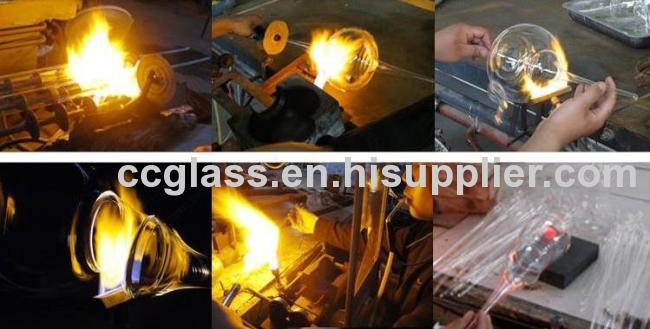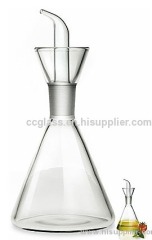
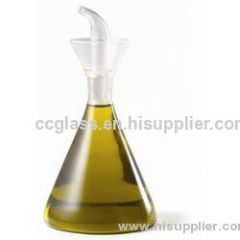
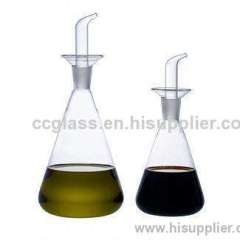
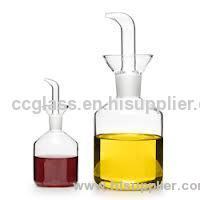
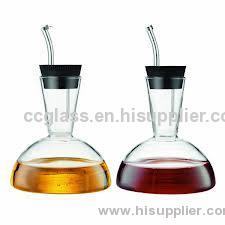

Conical Oil Jar Cruets
| Min. Order: | 1000 Piece/Pieces |
|---|---|
| Trade Term: | FOB |
| Payment Terms: | T/T, WU |
| Supply Ability: | 40000 pcs/month |
| Place of Origin: | Hebei |
Company Profile
| Location: | Cangzhou, Hebei, China (Mainland) |
|---|---|
| Business Type: | Manufacturer |
| Main Products: | Glass Teapot/coffee Pot, Glass Mugs/cups, Glass Bongs, Glass Pipes/bubblers |
Product Detail
| Model No.: | GCT002 |
|---|---|
| Means of Transport: | Ocean, Air |
| Size: | 4" |
| Length: | 10 |
| Style: | Transparent |
| Material: | Others |
| Usage: | Food |
| Color: | White |
| Brand Name: | C&C Glass |
| Material: | Borosilicate Glass |
| Craftsmanship: | Hand Made |
| Usage: | Kitchen |
| Production Capacity: | 40000 pcs/month |
| Packing: | Client's Requirements |
| Delivery Date: | Depending on Order Quantity |
Product Description
Conical Olive Jar Cruet
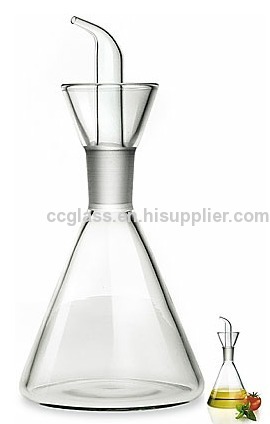

A cruet also called a caster is a small flat-bottomed vessel with a narrow neck. Cruets often have an integral lip or spout, and may also have a handle. Unlike a small carafe, a cruet has a stopper, lid, or phoedelia.
Cruets today typically serve a culinary function, holding liquid condiments such as olive oil and balsamic vinegar. They often have a filter built into them to act as a strainer, so that vinegar containing herbs and other solid ingredients will pour clear. Cruets also serve as decanters for lemon juice, garlic juice, and other fine gourmet oils. They are also used for the serving of the wine and water in a Catholic mass. In the UK a small cruet can also hold previously ground salt or pepper.
Borosilicate glass is a type of glass with the main glass-forming constituents silica and boron oxide. Borosilicate glasses are known for having very low coefficients of thermal expansion(~3 × 10−6 /°C at 20°C), making them resistant to thermal shock, more so than any other common glass.
In addition to the quartz, sodium carbonate, and aluminum oxide traditionally used in glassmaking, boron is used in the manufacture of borosilicate glass. The composition of low expansion borosilicate glass such as those laboratory glasses mentioned above is approximately 80% silica, 13% boric oxide, 4% sodium oxide, and 2-3% aluminum oxide. Though more difficult to make than traditional glass due to the high melting temperature required, it is economical to produce. Its superior durability, chemical and heat resistance finds excellent use in chemical laboratory equipment, cookware, lighting and, in certain cases, windows.
Borosilicate Glassware Features and Advantages
1,they are heat resistant,suitable for use in microwave,dishwasher and stove
2,offer a variety of application possibilities: baking and cooking, preparing and serving, cooling and freezing (down to -35°C/-31°F)
3.show a high resistance to sudden temperature changes with a temperature difference of 140°C/284°F(three times as high as normal glass or lead crystal glass)
4,are produced from clear borosilicate glass which is free of smell and flavor,does not discolor and show high chemical and mechanical resistance
5,do not give off any substances and therefore are suitable for allergy sufferers
6,are easy to clean and hygienic in use through the pore-free surface
7,come in superior and functional product design for an optimal preparation of beverage and meal
Sophisticated Hand Blown Craftsmanship,Uniform Mold
As a more advanced glass material,Borosilicate glass were widely used in Chemical and Medical industry and High end Kitchenware in most European and American countries.With sophisticated mouth blown craftsmanship,workers needs to constantly rotate the glass embryo in order to heat the glass uniform.This is the most significant special features of hand made glasswares compared with other glasswares
